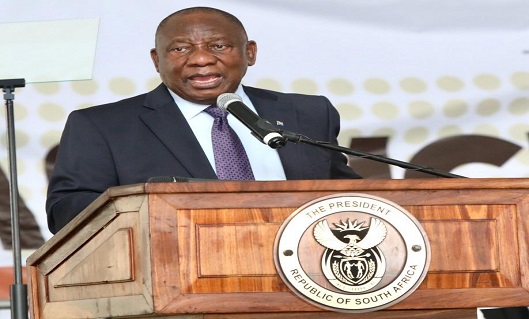
Thembisa Shologu
President Cyril Ramaphosa has urged all South Africans to honour the memory of those who sacrificed their lives for the nation’s cherished rights.
His call comes on the 30th anniversary of Human Rights Day, marked under the theme “Three Decades of Respect for and Promotion of Human Rights.”
This occasion commemorates the Sharpeville Massacre of 1960, where apartheid police fatally shot peaceful protestors opposing discriminatory pass laws, leaving 69 dead and 180 injured.
Delivering a keynote address in Sharpeville, President Ramaphosa reflected on the journey from apartheid repression to democratic freedom.
“We gather here in Sharpeville on this day so that we may pay tribute to those who fought for the rights that we today hold so dear, so that we may remember the severe hardships they endured and the great sacrifices that they made.
“Sixty-four years have passed since the ground on which we gather here in Sharpeville bore witness to one of the worst atrocities committed by the apartheid regime against the South African people.”
He highlighted the dangers faced by activists, leaders, and freedom fighters in the struggle for justice and equality.
“We gather here so that we may trace our journey as a nation over the last 64 years from a state of discrimination and repression to a land of democracy and freedom.”
Ramaphosa said the relentless struggle fought and journey travelled by other community activists, traditional leaders and religious groupings, freedom fighters, and friends and supporters worldwide was dangerous.
The president emphasised that it was a struggle that sought, above all else to achieve a South Africa which belongs to all who lived in it, black and white, for justice is not limited to the courts and a struggle for social and economic justice.
Ramaphosa highlighted the quest to fulfil the demands of the Africans’ Claims of 1943 and the vision of the Freedom Charter, culminating in the adoption of the Bill of Rights.
“Ours was a struggle to realise the vision of the Freedom Charter, adopted by the Congress of People in 1955, of a South Africa that is prosperous and free and in which all enjoy equal rights and opportunities, he said, adding that it was these principles and these ideals, these struggles and these sacrifices, that enabled the achievement of our democracy and the adoption of the Bill of Rights that is at the centre of our democratic Constitution.
“It is about recognising the right of every person to an environment that is not harmful to their health or wellbeing. It is about the sustainable management of our natural resources and conserving our environment and biodiversity for future generations.
Acknowledging progress made over 30 years, Ramaphosa noted advancements in social and economic rights, such as improved living conditions and healthcare outcomes. Despite these strides, he recognised ongoing challenges, including racism and inequality. He emphasised the importance of defending Chapter 9 institutions to uphold constitutional mandates and address human rights violations.
“We have much to celebrate; millions of South Africans have been lifted out of dire poverty. Eight out of every ten households have proper housing. Nine of every ten homes have electricity and access to clean drinking water.
“South Africans are living longer. Far fewer women are dying in childbirth, and far fewer children are dying in infancy, and this has been made possible because we have, as a country, focused on correcting the injustices of the past and meeting the needs of the poor and excluded,” he said.
Chairperson of the South African Human Rights Commission Christoffel Nissen echoed concerns about persistent issues like racism and inequality. He called on President Ramaphosa to safeguard Chapter 9 institutions and ensure the fulfilment of their vital role in society.
“Today, in 30 years of democracy, unfortunately, President, our South African community, and our citizens around the country sadly to say, we still face amongst all issues that as a human proper encounter in this country, racism is the top issue that the HRC deals with.
“The second issue is the issue of inequality in this country; we are dealing with it, Mr President. We are being taken to court, and the court has ruled against us because we fought for people to have water on a farm; in one province, we had to issue an order to a municipal manager to appear before the court and be arrested because of failure to deliver the primary service to our people.
“Mr President, we call upon you to please defend the Chapter 9 institutions and ensure the execution of the Chapter t 9 institution finds the right place in society. In the 30 years of democracy, we cannot continue violations of human rights whether it is racism, inequality, or when it is basic services such as water, education and electricity,” he said.
SOURCED FROM GPG WEBSITE.

